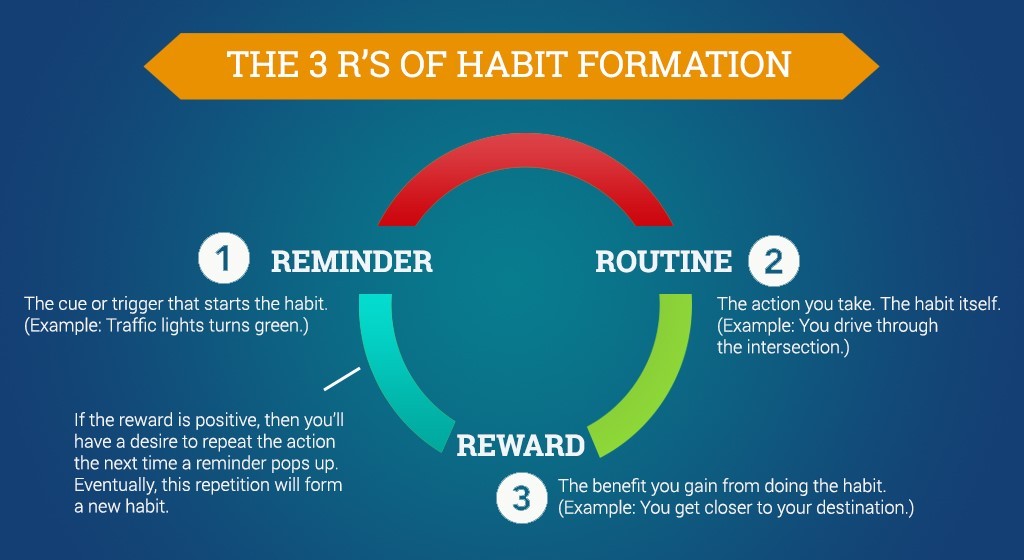
What Are Habits?
Let's define habits. Habits are the small decisions you make and actions you perform every day. According to researchers at Duke University, habits account for about 40 percent of our behaviors on any given day.
Your life today is essentially the sum of your habits. How in shape or out of shape you are? A result of your habits. How happy or unhappy you are? A result of your habits. How successful or unsuccessful you are? A result of your habits.
What you repeatedly do (i.e. what you spend time thinking about and doing each day) ultimately forms the person you are, the things you believe, and the personality that you portray. Everything I write about – from procrastination and productivity to strength and nutrition – starts with better habits. When you learn to transform your habits, you can transform your life.
Learning to build good habits is not about how quickly you can master them. It’s about how good you are at maintaining them.
In a world where everything is just a click away, you’re used to things happening quickly. And, of course, your goals are no exception. You want that healthy lifestyle, speedy productivity, or an amazing relationship – and you want it right now. So when you start that 30-day fitness challenge yet find yourself struggling to get out of bed every morning and head to the gym, you become discouraged and frustrated. You might even give up.
1. Start Slowly
Most people want to create big change as quickly as possible.
They want to go from zero to four gym sessions every week, switch to a healthy diet overnight, and meditate for 20 minutes every day even though they've barely managed 5 minutes in the past.
The problem, of course, is that this requires a tremendous amount of willpower. And research has shown that willpower works a lot like a muscle. If you use it a lot, it will get tired. And when it does, you'll be very likely to quit.
Ease your way into new habits. Although it can be tempting to dive right into it, it’s recommended that you start slowly then build up.
Your goal, at this point, is to establish the habit behavior. You want to familiarize yourself with your new habit and start fitting it into your routine. Instead of doing 100 push-ups each day, begin with 10. Rather than overhauling your entire diet, simply add a vegetable to every meal. Smaller actions require less thought, which requires less effort. Once these actions become consistent, then they’ll start to feel more natural. Soon, they’ll become a regular part of your daily routine.
The solution to this problem is to start so small that it hardly requires any willpower at all:
- Instead of doing fifty pushups per day, start with five.
- Instead of switching to a new diet, add a vegetable to every lunch.
- Instead of jumping on a rebounder for twenty minutes per day, start with two minutes.
Always focus on establishing the actual habit behavior first. Never increase the effort before it has become a natural part of what you do every day.
2. Don’t Rock the Boat

If you prefer visual cues, then this tip will be smooth sailing.
Using a physical calendar and a marker, create a visual reminder of your habit. Pin the calendar to your wall or place it on your desk; and whenever you complete your habit for the day, draw an “X” on that day in your calendar. Within a few days, you’ll have a steady flow. From there, your only job is to stay afloat and not rock the boat.
3. Be Clear
If you’re serious about your new habit, vague intentions like “I'll try to hit the gym three times this week” won’t cut it.
Research has shown that you'll be much more likely to follow through if you've decided beforehand exactly when and where the behavior is going to take place.
Implement your habits with absolute clarity. Vague statements, such as “I’ll try to write 500 words a day”, aren’t effective.
To increase your chances of following through with your new habits, you must clearly state where and when they’ll take place. Here are two helpful ways to achieve this:
- Linking: Link your new habit to an established activity. For example, “Before I go to bed, I will pack a healthy lunch.”
- Scheduling: Schedule your new habit. If you’re trying to improve your writing skills, for instance, schedule a “writing appointment”, where you’ll sit and write for a designated period of time.
4. Reward Yourself

If you’re like most people, you’re much better at beating yourself up for a bad performance than you are at rewarding yourself for a good one.
When it comes to managing ourselves, for some reason, we seem to prefer the stick to the carrot. And that’s a shame because research has shown that celebrating your progress is crucial for your motivation.
When it comes to managing ourselves, for some reason, we seem to prefer the stick to the carrot. And that’s a shame because research has shown that celebrating your progress is crucial for your motivation.
Be proud of your achievements. Not only is celebrating your progress crucial for your motivation, it makes you feel good, too. Those empowering feelings of achievement and pride will inspire you to take more action and create even bigger successes.
However, rewards don’t have to be costly. It could be something small, like visiting a movie theatre, spending time with your significant other, or taking a relaxing bubble bath.
Make it a priority to feel good about yourself. Every step, no matter how small, is a step in the right direction.
5. Eliminate Obstacles

Make the process easier for yourself. If one of your goals is to eat healthier, then keeping a cookie jar on your kitchen counter will only undermine your efforts. Instead, replace the cookie jar with a colourful bowl of fruit. This will help to, ultimately, change your environment and increase your chances of success.
When you eliminate the obstacles, you’re more likely to maintain your new habits.
6. Use Your Social Network

Good habits are behavioural traits, and the people around you can have a powerful impact on your behaviour. If you’re inspired to pursue your dreams and visions, but you’re surrounded by naysayers and pessimists, then it’s time to expand your social circle. Connect with others who also share your same drive and ambition to succeed.

In many ways, your environment drives your behavior. Have you ever walked into your kitchen, spotted a plate of cookies on the counter, and eaten them just because they were in front of you? If so, you know what I mean.
Professor of psychology and bestselling author, Mihaly Csikszentmihalyi, provides an excellent framework to shape your environment to support your desired habits.
7. Commit Yourself
Imagine it’s 6:00 am and your alarm goes off. Within seconds, your plan of going to the gym before work is in jeopardy as your brain starts rationalizing.
”Hmm, I’m actually really tired. I wonder if it’s even healthy to work out when I’m this tired. I could go to the gym after work. Or, I could go to the gym tomorrow morning instead. Yeah, I’ll hit the snooze button.”
But then, you remember that you’ve promised a friend to meet up the gym at 7:00 am.
Or, that you’ve committed to your workout plan by sending a friend fifty bucks every time you fail to get to the gym before work.
Or, that you’ve declared publicly to your family/blog readers/Facebook friends to stick to your workout plan for thirty days.
Or, if necessary, all of the above.
Suddenly, going back to sleep won’t be such an appealing option. By pre-committing this way, you can add an extra layer of accountability that makes you push through even when it’s hard.
Make a commitment to your new habits. For instance, hurrying home after a long and stressful day at work can be very enticing – rather than going to the gym, like you’d initially planned. But if you’d promised a friend that you’d meet up, then it makes it harder to decline.
By committing yourself to your new habits, it holds you accountable for your decisions, providing you with an extra push when things get difficult.
8. Think Long Term
The 21-day rule is just a myth. There is no specific amount of time required to build a habit. Short-term fixes, such as 7-day cleanses or 21-day challenges, are meant to produce fast results – but they’re not sustainable.
So how long does it take to form good habits? As long as it takes. The key is to create lasting change, and this can be done by having “short-term tasks” and “long-term targets”.
Your targets are the bigger goals and dreams that you want to accomplish, while your tasks are the daily activities that you complete in order to make your goals a reality. For instance, one of your targets could be publishing your first book, and the corresponding daily task would be contacting a new agent.
Tasks make your lofty targets appear within reach. It’s merely a matter of time – and consistency – before you achieve your goal.
9. Make It Personal

Above all, this is about you. In every moment, you need to believe that your new habits are part of your identity. Reinforce this notion with statements or affirmations, such as “I’m the kind of person who takes my mental wellbeing seriously. It’s important that I meditate for ten minutes every day.”
Repeat these statements on a daily basis and truly absorb them. Eventually, they will become a part of you.
Stick to Your Habits

If you’re finding it hard to maintain good habits, don’t be discouraged. By strategically shifting your mindset, you can begin to put yourself in the right direction – and make those habits stick. And, while you’re mastering your habits, Fabulous can help you! Our Build an Iron Self-Discipline Journey can help you learn how to motivate yourself and stick to your habits.
Bonus Tip: Change Your Mindset
Whenever you're creating a new habit, adopt a ”scientist & subject” mindset. Consider everything you do a behavioral experiment where each setback provides valuable data for your next step.
Shift your attention away from the long-term goal and instead focus on showing up and doing your habit every single day.
No comments:
Post a Comment